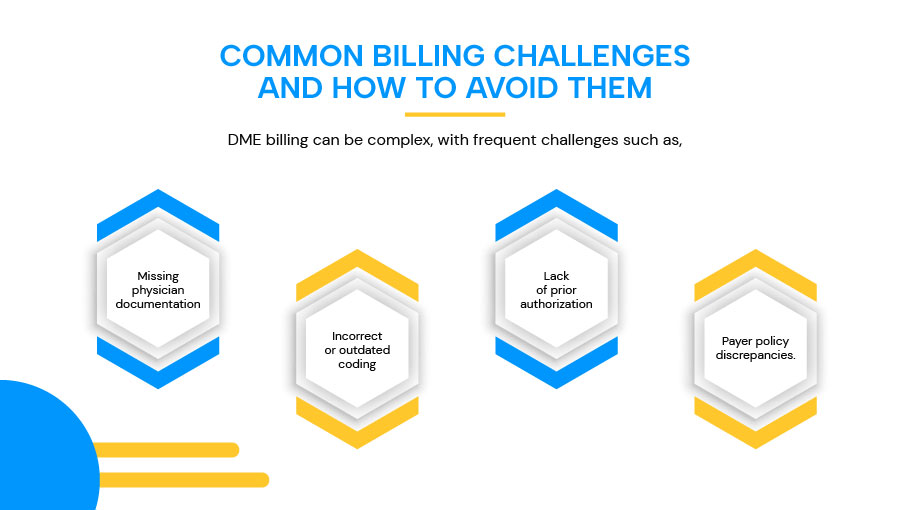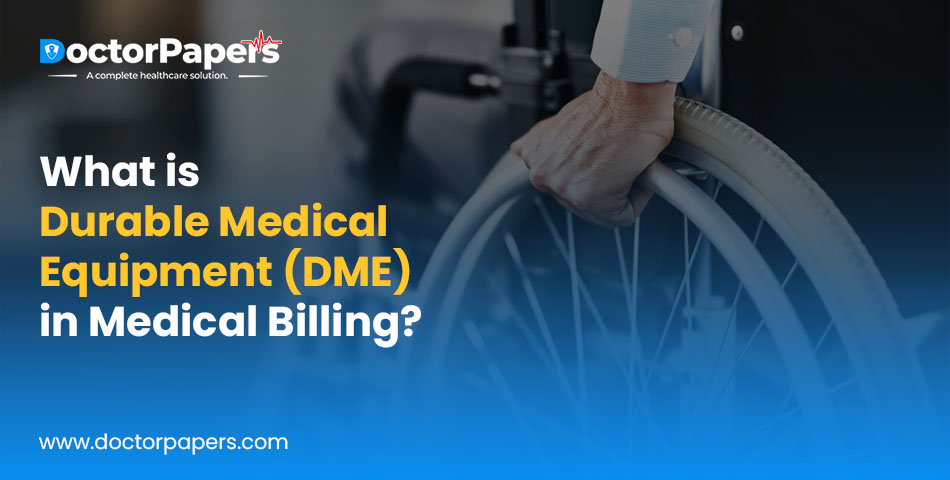Durable Medical Equipment (DME) refers to healthcare devices and supplies that are prescribed by a physician to assist patients in recovery or managing chronic conditions. Unlike disposable medical supplies, DME is designed for repeated use and serves long-term medical purposes. It plays a significant role in improving patient outcomes, supporting quality home-based care, and reducing inpatient admissions.
DME is significant in the context of revenue cycle management because it involves specific billing and coding rules. Understanding how to properly manage durable medical equipment billing and utilizing professional medical billing services ensures accurate reimbursement and compliance with payer requirements. These services help providers handle documentation, coding, and claim submission more efficiently, reducing errors and denials.
What Qualifies as Durable Medical Equipment?
The Centers for Medicare & Medicaid Services (CMS) defines DME as equipment that:
- Can withstand repeated use
- Is primarily and customarily utilized for a clinical purpose
- Is generally not useful to a person in the absence of illness or injury
- And is designed for safe and effective use at home.
Common examples include wheelchairs, walkers, hospital beds, oxygen systems, nebulizers, and CPAP machines. These devices enhance patient mobility, support respiratory health, and contribute to overall well-being. Healthcare Providers and billing specialists must understand these categories to ensure proper claim submissions.
DME in Medical Billing and Coding
Durable Medical Equipment billing involves specialized procedures distinct from standard healthcare medical services. Claims are processed using specific Healthcare Common Procedure Coding System (HCPCS) codes and Current Procedural Terminology (CPT) codes. Proper coding necessitates comprehensive documentation, including physician orders, proof of medical necessity, and sometimes patient-specific details such as measurements or usage instructions.
Modifiers may be necessary to indicate rental versus purchase, replacement, or repair of equipment. Since missing or incorrect claims often lead to delays or denials, maintaining accurate documentation is crucial. Partnering with experienced billing and coding services assists in simplifying this process and improving financial performance.
Insurance Coverage and Reimbursement for DME
Insurance policies, including Medicare and private health plans, provide specific guidelines for DME reimbursement. Coverage generally requires prior authorization and validation of medical necessity. For instance, Medicare covers many DME items under Part B but has strict documentation and supplier enrollment requirements.
Common obstacles include denials for insufficient documentation, coding errors, or non-covered items. Comprehending payer-specific guidelines assists providers in securing timely payments and claim rework. Medical billing services specializing in DME can navigate these challenges and maximize the revenue cycle.
The Role of DME Suppliers and Billing Companies
DME suppliers are responsible for providing equipment, educating patients, and ensuring compliance with usage instructions. Their administrative teams must track inventory, manage rentals and purchases, and maintain accurate patient records.
By handling claim submissions, verifying insurance eligibility, obtaining prior authorizations, and appealing denied claims, billing companies support DME suppliers. Accurate billing and coding services are for minimizing compliance risks and optimizing reimbursements. Providers benefit from partnering with experienced firms that understand both regulatory requirements and industry best practices.
Common Billing Challenges and How to Avoid Them

DME billing can be complex, with frequent challenges such as,
- Missing physician documentation
- Incorrect or outdated coding
- Lack of prior authorization
- Payer policy discrepancies.
To address these issues, providers should maintain thorough documentation, stay updated with payer rules, and invest in staff training. Many practices also outsource to specialized medical billing services that offer technology-driven solutions and compliance expertise. Proactive denial management and audit readiness are critical for success.
Advancements in DME and Revenue Cycle Management
- Durable Medical Equipment demand is rising due to the growth of home healthcare, aging populations, and chronic disease management.
- The integration of telehealth and remote patient monitoring devices is further expanding the scope of DME.
- Future billing processes are expected to incorporate increased automation, real-time eligibility verification, and value-based care models.
- Providers and suppliers that utilize advanced billing and coding services can implement these changes, maintain regulatory compliance, and enhance patient access to essential healthcare equipment.
FAQs
What is included in DME billing?
DME billing includes coding, documentation, and claim submission for items like wheelchairs, oxygen equipment, and CPAP machines.
How do Medical Billing Services help with DME?
They manage insurance verification, authorization, coding, and appeals to ensure timely and accurate payments.
Why is accurate documentation important in DME billing?
Proper documentation proves medical necessity and helps prevent denials, ensuring compliance with payer guidelines.
Does insurance cover Durable Medical Equipment?
Most insurance plans, including Medicare and Medicaid, cover DME if it is medically necessary and prescribed by a licensed healthcare provider. However, coverage may vary depending on the policy and type of equipment.
What are common challenges in DME billing?
DME billing can be complex due to strict documentation requirements, prior authorizations, frequent claim denials, and the need for detailed physician orders. Errors in coding or missing paperwork often delay payments.
Final Thoughts
Durable Medical Equipment is a vital part of modern healthcare, enhancing patient care and reducing hospital dependency. For providers and suppliers, proper DME billing and coding are crucial to financial stability and compliance. By investing in professional medical billing services and technology-driven solutions, healthcare organizations can reduce errors, accelerate reimbursements, and deliver quality care.






